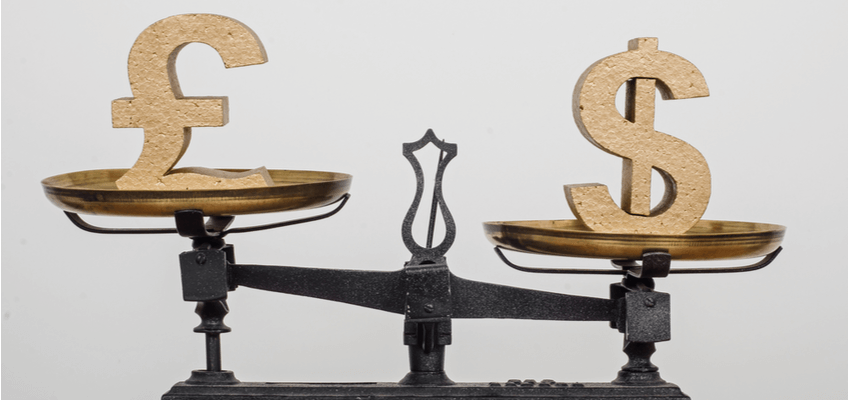
How dollar strengthening against the pound affects businesses
British business owners can’t help but notice that the pound against the dollar has hit a record low. This has a lot to do with the remarkably strong performance of the US dollar, which is higher than it’s been for decades. Many established currencies including the EUR and JPY are weak against the dollar right now, which is not typical.
However, the UK pound (GBP) also fell particularly dramatically against the dollar, and showed weakness against foreign currency like the EUR and the JPY too, even though it recently began to stabilize. The low pound against the dollar stems from many economic factors, including slow economic growth due to Brexit and the war in Ukraine, rising energy prices and the cost of living, rapid inflation, and especially by a lack of confidence in the UK’s economic leadership.
Global economic conditions also have an effect. The US economy recovered faster than others after the pandemic; the war in Ukraine is disproportionately affecting consumer prices in Europe and the UK; and USD is seen as a safe haven in times of turmoil, attracting investment away from other currencies.
The British pound is an international currency, so a weak pound sterling has ripple effects across the global economy. The falling pound pushes up the cost of imports, affecting consumer spending ability and limiting growth in the UK. The US is affected by the weakness of one of its top trading partners, and business owners need to make careful decisions to avoid losing money in exchange rates and currency conversions.
In this article, we’ll discuss the causes of the weaker British pound to USD, consider the impact of a falling pound on the economy in the UK and the US and on businesses within and outside of the UK, and share some tips for coping with the pound’s fluctuations. This should not be considered as financial advice.
Many currencies have fallen sharply against the US Dollar


The pound’s fluctuation owes a lot to the US dollar. When the dollar is strong, like it is today, all other currencies fall in comparison. A combination of a relatively fast post-covid recovery, rising interest rates, and the perception of US dollar-linked assets as a safe haven in turbulent times helped the USD to the highest rates it’s reached for 30 years.
As a result, emerging and established currencies have tumbled. The South Korean won fell to a 13-year low in September 2022, the Japanese yen fell to a 24-year low, and the Euro reached parity with the dollar for the first time in almost 20 years.
How much has the Pound fallen?
That said, the British currency plummeted faster than any other. For several decades, the British pound averaged around $1.5. That’s been slowly declining at least since 2017, when the UK voted to leave the EU, but it speeded up in the past year.
As shown in the graph below, the pound fell against the dollar from 1.35 in November 2021 to approximately 1.2 by the beginning of September, then dropped to a historic low of 1.03 on September 26, 2022.
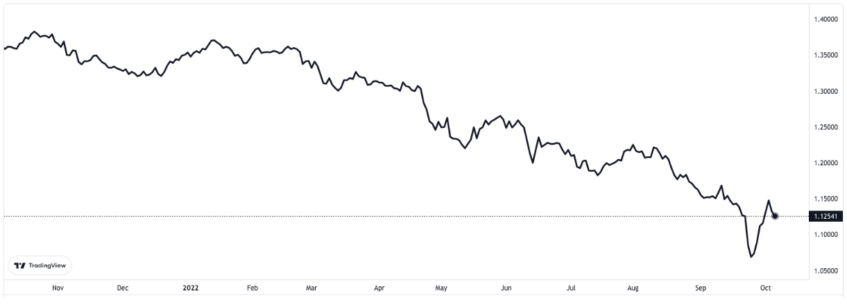

This marks a decline of 22% from 6 months earlier. The price of 5-year UK bonds, which allows investors to lend money to the government, showed its sharpest fall since 1991.
In the last few days, the British pound to USD exchange rate has improved slightly to USD1.13, but that’s still a long way from its normal position.
How has the British pound fallen so low, so fast?
The financial causes of the collapse in the British Pound
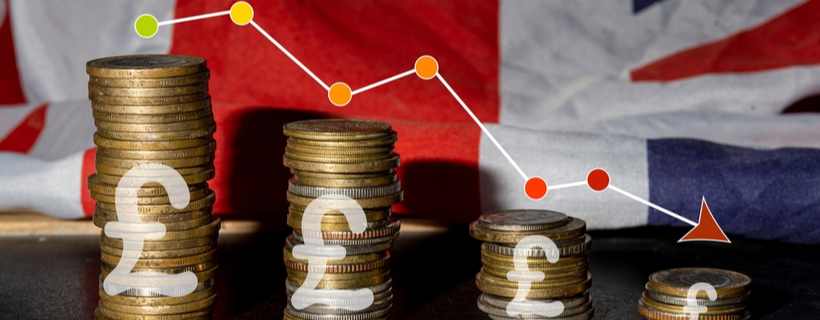

The pound’s fluctuations reflect how people feel about the currency. The pound falling means that businesses, governments, investors, and individuals worldwide are not feeling positive about the UK economy and its possibilities for future growth and returns.
But it’s rare for economic conditions to have just one cause. Today’s weaker pound sterling is due to a number of factors, including Brexit, the war in Ukraine, and the strong dollar. Here’s a rundown of some of the causes of the weak British pound.
Low confidence in economic leadership
September brought the “mini budget” from then-Prime Minister Liz Truss, which proposed cutting taxes and raising borrowing, and immediately brought the pound to its low of $1.03. It was seen as unrealistic and spooked the markets. “Confidence in the UK economy is low right now,” said Pao-Lin Tien, an assistant professor of economics at George Washington University
High inflation
The UK is seeing high inflation with little sign of it slowing down. The war in Ukraine and the impact of Brexit pushed up prices for energy and food, while growth is lagging. The UK’s central bank, the Bank of England (BoE) was slow to raise interest rates to put the brakes on inflation, and the weaker pound only adds to it. High inflation and a weak pound form a vicious cycle which keeps pushing inflation higher and the pound lower.
Leaking investment
Low interest rates, high inflation, and a sense of instability combine to discourage people and businesses from investing in the UK. Investors are moving money to safer havens, which further lowers demand for assets linked to the British pound. A stated purpose of Brexit was to reduce freedom of movement into and out of the UK, which discouraged investors from Europe and made it a less attractive place for international organizations to store their money.
A net trade deficit
The UK imports a lot of products and has few exports, which means it has a net trade deficit because it spends more than it earns. A trade deficit causes foreign currency to flow out, depleting the UK’s reserves and leaving it short on capital.
Rising debt levels
The UK has had a high but reasonable debt burden for a long time. However, the recent budget proposed increasing borrowing at a time when international interest rates are rising. Higher interest rates mean repayments will cost more, leaving the government less able to stimulate growth. The weaker pound and stronger dollar also raises debt levels because of the imbalance in exchange rates.
Trade friction
Brexit left the UK with few established trade partners. The UK government has not signed many bilateral trade agreements since then, and negotiations with the EU have been bitter and unsuccessful. Economists are worried that the UK will struggle to trade with other countries, which dents confidence in the currency and drags the pound down even more.
Uncertainty about UK’s economic outlook
When the UK left the EU, it increased the cost of trading for UK exporters and businesses that work with overseas markets. This led to higher prices for UK goods and reduced demand from foreign customers who could choose lower-priced goods from other sources.
Many businesses are avoiding working with UK companies and service providers because of the lack of clarity around taxation rates and ease of movement for foreign employees. Declining demand for UK exports and services means the pound falls further.
The strong Dollar
The COVID-19 pandemic slowed down growth all around the world, but the US saw the fastest recovery. Its central bank was also the first to start raising interest rates, which attracted more foreign investment and boosted the dollar still further. When the dollar is strong, the pound is going to be weak in comparison, and vice versa.
What does the Pound’s fluctuation mean for the UK economy?
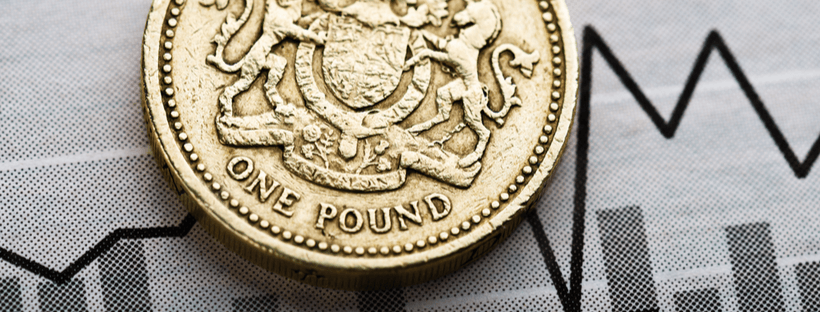

Higher prices for imports
The falling pound is mostly negative for the British economy. Imported goods are mostly priced in US dollars, so a weaker pound makes them more expensive. The UK imports approximately half of its gas and 46% of its basic foodstuffs. When the pound fell, it pushed up consumer prices and exacerbated a cost of living crisis in the UK.
Less consumer spending
British citizens are struggling to pay food, fuel, and heating bills, and they have little left over for discretionary spending. As consumer spending falls, businesses enjoy less revenue and the economy contracts, which just weakens the pound even more.
Raised inflation
At the same time, a weaker pound is pushing inflation higher. This makes imports more expensive, which raises the pressure on employers to increase wages and on the Bank of England to continue a policy of quantitative easing, which fuels more inflation.
Loss of investment
The UK is also seeing investors leave its markets in droves. The pound’s fluctuation is making people nervous about how volatile it is, plus a weaker pound means that foreign investors enjoy less profit after they convert their income into their local currency. Fewer investors means less capital to spend on stimulating growth.
More competitive exports
However, there are a couple of brighter spots. When the pound is low it makes UK exports less expensive for buyers overseas. It helps that anything priced in USD is much more expensive in comparison. Cheaper exports help UK manufacturers and international corporations to sell their goods in foreign markets. At the same time, costlier imports encourage domestic customers to buy goods from UK producers instead of their overseas competitors.
Increased tourism
The falling pound is also good news for British tourism. Overseas travelers, especially American tourists, can buy more hotel rooms, luxury goods, and UK experiences with the same amount of dollars. This entices more people to vacation in the UK and attracts more money into UK restaurants, tourism sites, and retailers. Meanwhile, UK vacationers are less likely to holiday overseas because the pound has less buying power, so they’ll also spend more time and money at British holiday sites.
The Effect of the low Pound against the Dollar on the USA
In the US, the effects of the weak pound are mostly swallowed up by the larger impact of the strong dollar. The UK is a major trade partner with the US, so a weak pound against the dollar means that imports from the UK are now a lot less expensive.


On the flip side, however, the low British pound to USD makes US exports more expensive for UK customers. Many American companies that do a lot of business with UK companies are now finding it hard to make sales, because their products and services are extremely expensive in comparison with domestic competition.
The UK is also a significant source of tourism income for the US, and that’s likely to fall with the low pound against the dollar. Comparative exchange rates, together with the UK’s ongoing cost of living crisis, mean that a vacation in the US is far too costly for the average British traveler at the moment. Instead, Americans are heading to the UK to enjoy a relatively low-cost holiday.
How does the record low Pound affect businesses?


British businesses, small businesses and freelancers that work with British clients, and British exporters and cross-border sellers are all experiencing different impacts from the low pound against the dollar.
1. The cost-of-living crisis
As mentioned above, the weak pound has made the existing cost of living crisis in the UK even worse. Consumers are finding their spending power has dropped significantly since the beginning of the year, so they are cutting back on extras and trying to save money as much as possible.
Lower consumer spending trickles through to business spending, so companies in almost every vertical are seeing revenue slow down.
2. The effect on the ecommerce industry
A weaker pound means more expensive imports, so cross-border online sellers who buy from suppliers overseas are struggling to fill their inventory. At the same time, demand from UK online shoppers is lower because consumers lack the money for expensive imports.
However, ecommerce small business owners who can source their products from domestic producers and suppliers can overcome this hurdle, and even benefit from it. Domestic products can be priced more competitively than imports, so domestic sellers can make more sales thanks to the relative price difference.
3. The impact on service providers
UK service providers will see mixed results from the falling pound. Anyone serving the domestic market is likely to see lower demand, because economic conditions mean that everyone is tightening their budgets and trying to save money.
However, freelancers, contractors, and service small businesses could benefit from the weaker pound. Businesses that receive international business payments in USD, enjoy higher profits when they convert their income into GBP. Relative exchange rates also mean that their prices seem lower in comparison with the competition who price their services in USD.
4. The rising cost of business
The weaker pound sterling pushes up the cost of business in general. For example, energy bills are higher, so office expenses rise too. Raw materials and product components are more expensive. Even the price of meeting a prospective client for coffee is higher than it used to be, all of which increases business expenses and eats away at profit margins.
UK businesses are stuck in a bind: they’ll lose money if they don’t raise their prices, but if they do, they’ll risk losing sales.
5. The consequences for UK export business owners
When the pound is low against the dollar, it offers an opportunity for British exporters. The low British pound to USD means that UK products cost less than goods priced in USD, so exporters can make more sales to overseas markets.
British businesses that focus on exports will also benefit from the currency exchange when they convert income into GBP. Alternatively, companies that sell to US markets can hold their funds in USD and use it to directly pay suppliers or partners.
6. More expensive imports
Any British businesses that rely on imports find that the weaker pound makes it harder for them to turn a profit. Many raw materials, and commodities are priced in USD, so companies that need to import goods will see their costs rise. Higher priced imports are off-putting for customers, so import-heavy companies are struggling to close deals and sell their stock.
Will the Pound against the Dollar go up or down?
It’s hard to predict currency movements. Whether the British pound against the USD changes soon depends on the economic policy decisions made by each government as well as global inflation trends. The British currency has already improved from the record low pound against the dollar.
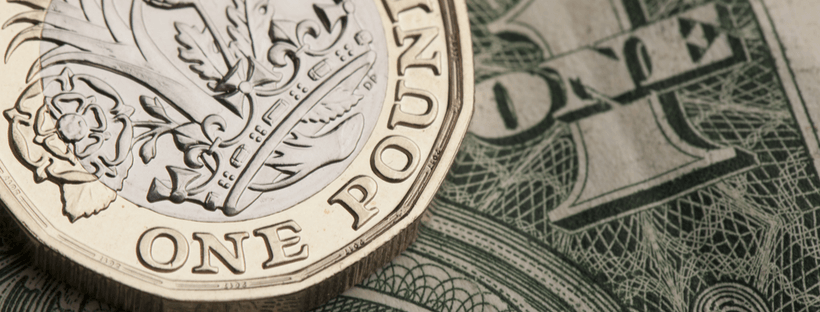

That said, economists don’t expect the pound against the dollar to improve significantly anytime soon. “Recovery is not on the horizon,” said Barry Eichengreen, a professor of economics at the University of California at Berkeley. However, readers should always do their own research before making currency-based decisions.
The usual way to improve the British pound against the USD would be for the Bank of England to raise interest rates, but the UK economy is very fragile at the moment. If the BoE raises rates too much or too fast, it could stamp out the low levels of growth and tip the country into a recession. That means that there’s no shortcut to a stronger pound.
Keep ahead of the Pound’s fluctuations
Although the variations in the pound against the dollar and other currencies can be confusing for businesses, there are ways to reduce the damage they could cause.
Stay updated with the upcoming dollar to pound trends
When business owners know what is happening with the British pound to the USD, they are able to make better business decisions. It’s a good idea to keep an eye on a GBP/USD index chart, which shows how the pound is falling or rising.
A USD currency conversion chart which tracks exchange rates with other major currencies can also help companies to understand the bigger picture of the flow of dollars worldwide and gain an insight into market trends in 2022.
Convert British Pounds to USD with Payoneer
Another tactic is to use a good payment service like Payoneer. Payoneer account holders can receive payment in GBP, USD, or 150+ other currencies. Payoneer UK helps users to save money on currency conversions with low cost foreign currency exchange and competitive exchange rates, so they don’t leak money when they convert funds from GBP to USD, or vice versa.
The benefits of Payoneer
Payoneer brings more advantages to businesses that are based in the UK or work with British partners, suppliers, or clients. A Payoneer account gives users low cost cross-border payments and free Payoneer to Payoneer transfers, along with local receiving accounts in GBP, USD, and 7 other currencies. Payoneer users also enjoy a Payoneer MasterCard, Payoneer’s working capital solution for Amazon and Walmart sellers, and easy withdrawals to their local bank account.
Info box overview of the British Pound
- Currency name: British pound
- Currency code: GBP
- Currency symbol: £,
- Central bank: Bank of England
- Countries used in: UK
- Major unit: One Great Britain pound
- Minor unit: One penny
- Minor units pennies per British pound: 100
- Note denominations: £5, £10, £20, £50
- Coin denominations: 1p, 2p, 5p, 10p, 20p, 25p, 50p. £1, £2, £5
*Please note, any insights provided in this article should not be taken as financial advice.




